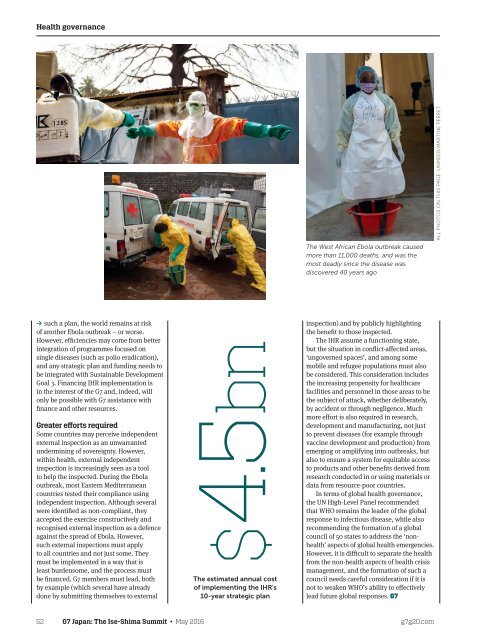G7_JAPAN
Create successful ePaper yourself
Turn your PDF publications into a flip-book with our unique Google optimized e-Paper software.
Health governance<br />
The West African Ebola outbreak caused<br />
more than 11,000 deaths, and was the<br />
most deadly since the disease was<br />
discovered 40 years ago<br />
ALL PHOTOS ON THIS PAGE: UNMEER/MARTINE PERRET<br />
→ such a plan, the world remains at risk<br />
of another Ebola outbreak – or worse.<br />
However, efficiencies may come from better<br />
integration of programmes focused on<br />
single diseases (such as polio eradication),<br />
and any strategic plan and funding needs to<br />
be integrated with Sustainable Development<br />
Goal 3. Financing IHR implementation is<br />
in the interest of the <strong>G7</strong> and, indeed, will<br />
only be possible with <strong>G7</strong> assistance with<br />
finance and other resources.<br />
Greater efforts required<br />
Some countries may perceive independent<br />
external inspection as an unwarranted<br />
undermining of sovereignty. However,<br />
within health, external independent<br />
inspection is increasingly seen as a tool<br />
to help the inspected. During the Ebola<br />
outbreak, most Eastern Mediterranean<br />
countries tested their compliance using<br />
independent inspection. Although several<br />
were identified as non-compliant, they<br />
accepted the exercise constructively and<br />
recognised external inspection as a defence<br />
against the spread of Ebola. However,<br />
such external inspections must apply<br />
to all countries and not just some. They<br />
must be implemented in a way that is<br />
least burdensome, and the process must<br />
be financed. <strong>G7</strong> members must lead, both<br />
by example (which several have already<br />
done by submitting themselves to external<br />
$4.5bn<br />
The estimated annual cost<br />
of implementing the IHR's<br />
10-year strategic plan<br />
inspection) and by publicly highlighting<br />
the benefit to those inspected.<br />
The IHR assume a functioning state,<br />
but the situation in conflict-affected areas,<br />
‘ungoverned spaces’, and among some<br />
mobile and refugee populations must also<br />
be considered. This consideration includes<br />
the increasing propensity for healthcare<br />
facilities and personnel in those areas to be<br />
the subject of attack, whether deliberately,<br />
by accident or through negligence. Much<br />
more effort is also required in research,<br />
development and manufacturing, not just<br />
to prevent diseases (for example through<br />
vaccine development and production) from<br />
emerging or amplifying into outbreaks, but<br />
also to ensure a system for equitable access<br />
to products and other benefits derived from<br />
research conducted in or using materials or<br />
data from resource-poor countries.<br />
In terms of global health governance,<br />
the UN High-Level Panel recommended<br />
that WHO remains the leader of the global<br />
response to infectious disease, while also<br />
recommending the formation of a global<br />
council of 50 states to address the ‘nonhealth’<br />
aspects of global health emergencies.<br />
However, it is difficult to separate the health<br />
from the non-health aspects of health crisis<br />
management, and the formation of such a<br />
council needs careful consideration if it is<br />
not to weaken WHO’s ability to effectively<br />
lead future global responses. <strong>G7</strong><br />
52 <strong>G7</strong> Japan: The Ise-Shima Summit • May 2016 g7g20.com
















